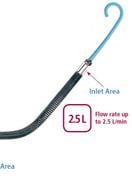
December 7, 2010 – A study comparing a transcatheter ventricular assist device (VAD) to intra-aortic balloon pumps (IABP) has been completed after interim analysis determined the primary endpoint was likely. The Impella, by Abiomed, significantly reduced major adverse events out of hospital.
The decision to end the PROTECT II study followed the recommendation of the Data Safety Monitoring Board. The study was designed to measure major adverse events at 30 days in high-risk percutaneous coronary intervention (PCI) patients randomized to receive hemodynamic support during the procedure with the Impella versus intra-aortic balloon (IAB). In addition, there were unanticipated confounding variables related to the use of rotational atherectomy in the study.
“Atherectomy was an unanticipated variable which resulted from the operators’ decision to ‘do more with Impella.’ Our investigators had unblinded knowledge of the treatment arm after randomization,” said William O’Neill, M.D., University of Miami and principal investigator of the study. “It is interesting that operators felt that they could do more complex interventions once randomized to Impella and this in and of itself is an important finding.”
These encouraging results were observed despite other significant treatment variables that were identified in the interim report. These included: two times the treatment of saphenous vein graft (SVG) (p=0.04) in Impella arm, higher contrast media (p=0.01) in Impella arm, 32% of IAB but only 6% of Impella patients left the catheterization lab with device implanted (p
“This groundbreaking study data will be utilized along with the presented USpella registry to help physicians identify the patients that receive maximum benefit from Impella as well as the small subset of patients where it may not be appropriate or for those that require longer support outside of the cath lab,” O’Neill said. “I look forward to the scientific presentation at the upcoming American College of Cardiology (ACC) in April and firmly believe that Impella will play a major role in treatment of many patients who need hemodynamic support during PCI.”
Summary and Conclusion of Protect II:
• For the entire study population, Impella significantly reduced out of hospital major adverse events (MAE) by 52% compared to IAB for the duration of the 90-day monitoring (p=0.02³, N= 302).
• There was an overall positive trend in the majority (88%, n=267) of patients in the study at the interim analysis, in which Impella reduced the major adverse event rate by 26% over the IAB (Impella 32% MAE vs. IAB 43% MAE, p=0.11).
• Impella provided a 47% reduction in major adverse events over IAB in a subgroup that represents 70% of the protocol study population (Impella 23% MAE vs. IAB 43% MAE, p=0.009). An analysis of a “PROTECT” score will be presented at the upcoming ACC in April.
• When using atherectomy, Impella significantly reduced repeat revascularization (p=0.02).
The data revealed confounding variables in the treatment between the two arms with the most significant differences related to two times more frequent use (p=0.04) and two times the number of passes per use (p=0.003) of rotational atherectomy in the Impella arm compared to the IAB arm, accounting for 12% (n=38) of total PROTECT II patients at the interim. Use of atherectomy during PCI has been previously shown to increase CK-MB release (heart enzyme) following PCI, triggering an endpoint in PROTECT II.
These data reported have been collected, validated and monitored by a third-party academic research organization and the MAEs were assessed at 30 and 90 days. An additional 125 patients have been enrolled since the midpoint of the study and are not yet included in this interim analysis. Additionally, all hospital charges were tracked by an independent health economic organization in coordination with the study.
For more information: www.Abiomed.com


 January 05, 2026
January 05, 2026 









